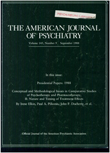Cortisol and Alzheimer's disease, I: Basal studies
Abstract
Patients with Alzheimer's disease and nondemented elderly control subjects participated in studies of cortisol secretion during sleep and at 9:00 a.m. and were given dexamethasone suppression tests (DSTs) and lumbar punctures. Nocturnal and 9:00 a.m. cortisol concentrations were significantly higher in the demented patients. CSF MHPG negatively correlated with mean nocturnal cortisol. The most severely demented patients had the highest 9:00 a.m. and mean nocturnal cortisol concentrations. DST results did not distinguish samples with substantially different nocturnal cortisol concentrations. These results suggest that measurements of basal plasma cortisol concentrations and dexamethasone suppression provide different information but support the notion of somewhat higher than normal cortisol concentrations in Alzheimer's disease patients.
Access content
To read the fulltext, please use one of the options below to sign in or purchase access.- Personal login
- Institutional Login
- Sign in via OpenAthens
- Register for access
-
Please login/register if you wish to pair your device and check access availability.
Not a subscriber?
PsychiatryOnline subscription options offer access to the DSM-5 library, books, journals, CME, and patient resources. This all-in-one virtual library provides psychiatrists and mental health professionals with key resources for diagnosis, treatment, research, and professional development.
Need more help? PsychiatryOnline Customer Service may be reached by emailing [email protected] or by calling 800-368-5777 (in the U.S.) or 703-907-7322 (outside the U.S.).



